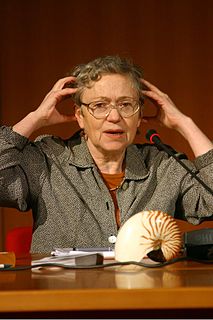A Quote by Alison Gopnik
Caring for children has always been one of the deepest and most satisfying things that a human being does, and yet it is hard to keep a healthy attitude toward it in our competitive, outcome-oriented society.
Related Quotes
It hasn't always been easy. There's a lot of hard moments. Sometimes you learn from the end of the bench. Sometimes you learn from injuries. Sometimes you learn the most through the hard things. If you can keep a good attitude and keep on working, eventually situations change, and you can put those things to use.
A glad welcome to this affirmation by a group of psychologists that the self does not stop at the skin nor even with the circle of human relationships but is interwoven with the lives of trees and animals and soil; that caring for the deepest needs of persons and caring for our threatened planet are not in conflict.
I believe that the most urgent need of parents today is to instill in our children a moral vision: what does it mean to be a good person, an excellent neighbor, a compassionate heart? What does it mean to say that God exits, that He loves us and He cares for us? What does it mean to love and forgive each other? Parents and caregivers of children must play a primary role in returning our society to a healthy sense of the sacred. We must commit to feeding our children’s souls in the same way we commit to feeding their bodies.
Our society is only as healthy as our most vulnerable citizens. It is unconscionable that the weakest links in our country are our hungry children. No other Western industrialized nation has widespread hunger within its borders. We really must put an end to hunger in the United States if we are to keep our prosperity and protect the future.
Undeniably, character does count for our citizens, out communities, and our Nation, and this week we celebrate the importance of character in our individual lives... core ethical values of trustworthiness, fairness, responsibility, caring, respect, and citizenship form the foundation of our democracy, our economy, and our society... Instilling sound character in our children is essential to maintaining the strength of our Nation into the 21st century.
Eat by Choice, Not by Habit combines the author's humor, deep compassion for others and knowledge about food in a way that makes me eager to follow her lead toward healthy eating-and more importantly, toward a healthy attitude about eating. She aptly teaches us all to frame our food issues in a language that is both liberating and comforting.
The best attitude to receive the Pope's teachings is to understand that he is a religious leader and the essence of his message comes from the Gospel, not from one ideology or another.And so, if our economic systems are not oriented toward the human person but only concerned with profits, he wants to confront the system and change it. This, by the way, is common to all the popes, it comes directly from the so-called social teachings of the church.






































